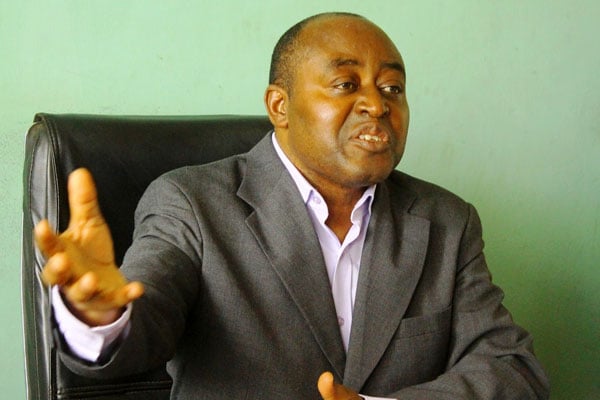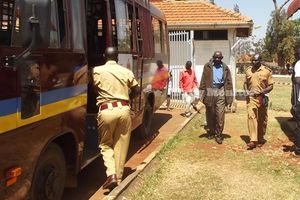
Former Rwenzururu Kingdom acting premier Thembo Kitsumbire during the interview yesterday. PHOTO/GILLIAN NANTUME
To get to the verandah of the one-room apartment of former Rwenzururu Kingdom acting premier, now in exile, one has to jump over puddles, pace by a line of one-room rentals, and residents brushing their teeth in the corridors.
We then push through clothes out to dry on a single wire line.
In eight years, this is the third slum Mr Thembo Kitsumbire is living in at Kisalosalo in Kyebando, a Kampala City suburb.
Before he was exiled to Kampala, Mr Kitsumbire was a wealthy man by any measure, with land in Bundibugyo, Kabarole, and Kasese districts in western Uganda.
He also had a house with 17 rooms in Kasese Municipality. The rooms catered for his 17 children.
“All my property has been sold to maintain me in Kampala. What I invested in 66 years has been destroyed in a period of eight years of confinement,” says the husband of three wives.
Genesis of his problems
On November 27, 2016, a joint military force commanded by then Brig Peter Elwelu, attacked the Rwenzururu Palace in Kasese District. Government says 103 people died in the clashes while Human Rights Watch estimates at least 156 dead. The Ugandan authorities arrested and charged more than 180 people in the weeks following the clashes.
The Omusinga (king) Charles Wesley Mumbere, was then subjected to the ignominy of public arrest. At the time, Kitsumbire, the acting prime minister of the kingdom, was not in the palace.
“I was at my home in Kiteso Cell, Kamayiba Parish. On December 15, 2016, I was summoned to the office of the resident district commissioner (RDC) (Lt Col James Mwesige). I thought we were going to discuss the security situation, but upon arrival, I was blindfolded and driven to Bushenyi Police Station where I was confined for a week,” he says.
“For the first two days, I was not given food, and the police officer who tried to give me porridge was arrested,” he adds.
Mr Kitsumbire was transferred to then high-security detention centre at Nalufenya Police Post on the eastern banks of River Nile in Jinja. He was then moved to Jinja prison, where he says a senior prison warden who tried to give him good food was dragged to the disciplinary committee for helping a terrorist.
“I fell very ill because my stomach could not handle the prison food. The court had to compel Uganda Prisons Service to transfer me to Luzira prison.
On March 16, 2017, I was granted bail at the High Court in Jinja City,” he says.
Since then, the 74-year-old Kitsumbire, who was charged with treason, misprision of treason, and terrorism, has never set foot in his home.
His bail conditions bar him from leaving Wakiso District, which is part of Kampala Metropolitan Area.
Tough conditions for freedom
Last year, the Omusinga and 217 royal guards were pardoned by the government and granted amnesty. But Mr Kitsumbire, who had been acting prime minister for 10 months, refused to apply for amnesty.
“When I was still going to court, I was told that there was dialogue between [King] Mumbere’s team and the government. I was not involved in the negotiations, but at the end of the day, our lawyers brought the amnesty form and told me to sign it,” he says.
On reading the claims he was supposed to assent to, Mr Kitsumbire says he made a decision that it was better to die in exile.

Journalists tour the Rwenzururu Kingdom palace following the raid in November 2016. PHOTO/file
“Part of the form read, ‘I so and so, consent that I was involved in fighting the government and causing loss of lives.’ I have never been involved in fighting the government of Uganda. I told them I would not sign the form whether it means being in exile for 27 years or being sentenced to death. And I do not regret my decision,” he says.
But Mr Kitsumbire’s response is vague on whether these were similar conditions the Omusinga assented to.
“That is what I think it means. What I know is that he signed the form and went home. I am not sure whether he admitted that he was a terrorist or whether he signed the form to escape the seven-year confinement in Kampala. I have not met him or communicated with him since 2016. But, I will ask him when I am released,” he says.
The old man claims several people have approached him, persuading him to sign the amnesty form.
“The Attorney General has sent members of Parliament to meet me. They come here and tell me I am going to die in exile since I am sickly. I have been operated on twice at Mulago hospital. But, I have refused. The government restored democracy, so justice should decide,” Mr Kitsumbire says.
In 1985, Mr Kitsumbire, a former teacher at Kilembe Secondary School and Kasese Secondary School, abandoned his profession to join the National Resistance Army (NRA) when the rebel group liberated Kasese District.
He was immediately appointed an assistant to the Special District Administrator at the time, Phinehas Manoni Katirima, now a General in the UPDF.
In 1990, Mr Kitsumbire joined Uganda Habitat for Humanity as country director, and 12 years later, he served Kasese District as vice chairperson of the Public Accounts Committee for 10 years. He then joined the Rwenzururu Kingdom as security minister and rose through the ranks to become Third Deputy Prime Minister.
Events leading to palace attack
Mr Kitsumbire admits that many in the Rwenzururu community yearn for some kind of republic that has been dubbed ‘Yiira,’ but denies there was a rebellion being organised.
“The Bayiira – many tribes who occupy the Rwenzori basin – started this struggle in 1830 when (Omukama) Kabalega used to rule that place. The struggle has always been there but I categorically deny any involvement or association with it. I am not the (Nelson) Mandela of the Yiira Republic. When the UPDF bombed the palace, we were just going about our normal cultural duties,” he says.
Mr Kitsumbire also disputes the claims that the royal guards were armed. He says the guards had only local cultural instruments that other cultural institutions possessed in large quantities.
“I do not agree with the claims that the royal guards were terrorists because these were people who had been trained by the former IGP, Kale Kayihura. It was a training arrangement between the Omusinga and Kayihura. They did not involve me in it. He even conferred on the Omusinga the rank of ‘General’,” he says.
“The Omusinga would bring the guards and the IGP would facilitate their training. I don’t know what for,” Mr Kitsumbire adds.
He asserts that the former IGP first trained 80 royal guards and then continued to train more.
“That entire circus was between the two of them. Maybe the IGP was training them to protect his fellow ‘General’. Maybe the royal guards felt they were being oppressed and ended up fighting. At that time, I was busy mobilising local and cultural leaders to fundraise for the Omusinga’s coronation anniversary,” he says.
While Mr Kitsumbire praises the government for restoring the cultural institutions, he urges it to take him to court so that his case can be concluded. He has also gathered five lawyers to help him petition the United Nations, the African Union, the European Union, and the East African Community to look into his plight.
“Surely, my family’s only prayer is for me to sign the amnesty and return home. They say they are missing me. They cry like the wife of (biblical) Job. That is how far much they have been reduced. If I am to ask for prayers, church leaders should pray for my family, but not for me,” he says.
To while away his long and lonely hours, Kitsumbire, who suffers from high blood pressure, was advised by his doctors to walk from Kyebando to the city centre and back, twice a week. He says after walking, he sleeps like a baby, without a single worry.



